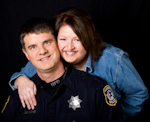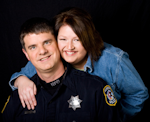Six steps to achieving "Work-Life Balance"
“Work-Life Balance” is something we are hearing a lot about recently, and something we’ve been touting for the better part of a decade in what we write and teach. It is especially relevant today as the newest crop of officers coming into the profession are now all from the “Millennial Generation,” a group that takes the concept of work-life balance very seriously. Still, even most of these millennial officers will someday experience challenges to leading a well-balanced life; the law enforcement profession is such that it can easily become all-encompassing, to the detriment of outside activities, family time, friendships, and old interests and hobbies. Older officers know this well. Regardless of what generation of officer you might be, achieving and maintaining a well-balanced life requires discipline and effort.
Are you living a well-balanced life, with work, family, friends and leisure in harmony with each other? If the answer is “Yes” you are fortunate. Maintaining work-life balance is difficult. But if you said, no, or you are unsure, the following principles offer some practical advice that will help you regain balance.
1. Connect and look for social opportunities with people who are not cops: It is a common belief among a lot of police officers that “cops should stick with cops, period. No one else will understand you or the world you see like another cop!” Maybe not as common as it once was, with the newer generation of officers entering the job now, but for many the message to “stick with your own” is still strong.
We disagree.
Broadening your social network is important to create life balance. It forces you to seek and find commonality with people whose experiences and worldview are very different from yours, and that is a good thing. Forming non-police friendships can be mutually beneficial and a way to remain connected with other ways of seeing the world
2. Reconnect with neglected family and friends: Do family you once considered close and integral still feel like an important part of your life? Are you connected to their world in a meaningful way? Soon after retirement, your name fades into a distant memory around the department and it will be family and friends from then on. Take steps now to ensure they are by your side later. Next, reconnect with old friends you’d like to stay in touch with, and tighten bonds with the new. In today s world of social networking, finding someone from the past is easier than ever and faster than ever, and social opportunities to build strong new bonds abound.
3. Reintroduce some old pastimes, hobbies, and interests to your life: Dr Kevin Gilmartin, PhD, in his book, Emotional Survival for Law Enforcement: A guide for officers and their families, describes a Usta as a former favorite activity you used to (usta) do (e.g., I usta go hiking, I usta love fishing, or I usta have a great fiancé). Over time, we become so wrapped up in work and the day-to-day of life they become mere memories. Dust some of them off, at least the ones that are safe to do (If yours is, “I usta be a helluva tight end in college” but now it’s 32 years and a couple slipped disks later, dusting that one off is just going to get you hurt. Badly. Maybe try something else.
4. Be a lifelong learner: Somehow, for a lot (most?) of us, once adulthood is firmly established we decide who we are now is who we will always be. But when we were a kids, or even young adults, seeking new skills and opportunities kept life fresh and fun. Where is it written that we need to stop that at some age? Want to learn the guitar? Okay, go do it. Think you have the next great crime story percolating in your brain but not sure how to put it on paper? Take a class or two in fiction or screenwriting and get to writing. Never stop looking for opportunities to learn new skills.
5. Leave work at work; it will still be there tomorrow: Possibly the biggest hurdle for many officers to clear is their inability to clear their heads and leave the job at station; they obsess over cases or problems at work when it’s time to be fully engaged in their personal time. Worse than obsessing over details of a case or something needing to be done is devoting time to the more frustrating aspects of “Administrative BS” that seems to occupy so much intellectual wavelength. In order to get on with the other four practices above, it’s first necessary to devote time to them, and that means leaving your (figurative) “cop hat” hanging in the locker at work with the real one. No matter how devoted to the job you are, practice leaving it behind at 42 time.
6. Look to colleagues who are living well-balanced lives and learn their “tricks”: Plenty of cops already live principles of work-life balance, and you probably know who they are. Sometimes the best learning style is observation/imitation. Being “more than a cop” doesn’t diminish the cop part of them, or you, and, done correctly, can enhance it greatly.
Leading a well-balanced life greatly benefits emotional and physical health, personal and professional satisfaction, and even has benefits related to both length and quality of life. It is also extremely easy to lose sight of. Make work-life balance a concerted discipline and see if it doesn’t benefit you immediately.

Michael Wasilewski
Althea Olson, LCSW and Mike Wasilewski, MSW have been married since 1994. Mike works full-time as a police officer for a large suburban Chicago agency while Althea is a social worker in private practice in Joliet & Naperville, IL. They have been popular contributors of Officer.com since 2007 writing on a wide range of topics to include officer wellness, relationships, mental health, morale, and ethics. Their writing led to them developing More Than A Cop, and traveling the country as trainers teaching “survival skills off the street.” They can be contacted at [email protected] and can be followed on Facebook or Twitter at More Than A Cop, or check out their website www.MoreThanACop.com.

Althea Olson
Althea Olson, LCSW and Mike Wasilewski, MSW have been married since 1994. Mike works full-time as a police officer for a large suburban Chicago agency while Althea is a social worker in private practice in Joliet & Naperville, IL. They have been popular contributors of Officer.com since 2007 writing on a wide range of topics to include officer wellness, relationships, mental health, morale, and ethics. Their writing led to them developing More Than A Cop, and traveling the country as trainers teaching “survival skills off the street.” They can be contacted at [email protected] and can be followed on Facebook or Twitter at More Than A Cop, or check out their website www.MoreThanACop.com.


